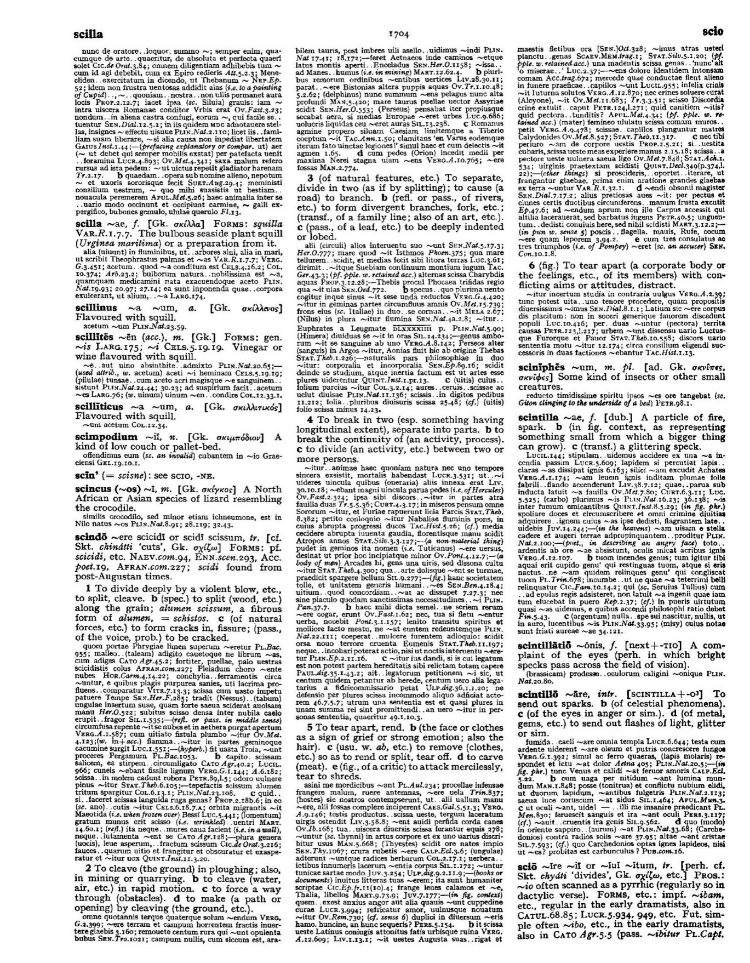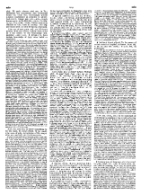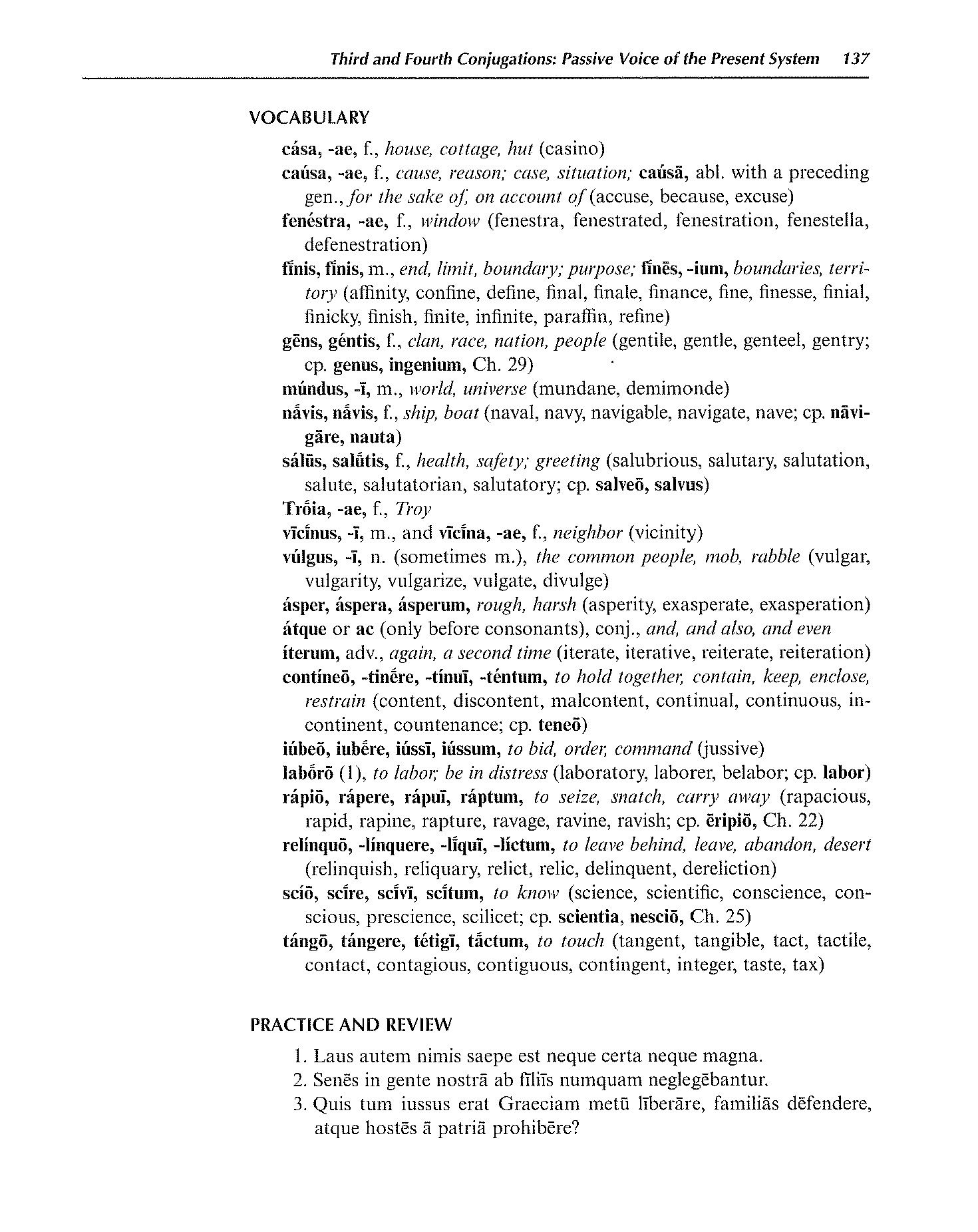
page_listing.tpl
page_subListingDetails.tpl
sub_listingDetails_style1.tpl
sub_listingDetails.title.tpl
scīre to know
scīre is a Latin Verb that primarily means to know.
Definitions for scīre
Wheelock's Latin
Verb
- 1
to know
English derivatives:
science scientific conscience conscious prescience scilicet
Oxford Latin Dictionary
Verb
- 1
(w. acc. of neut. pron., adj., etc.) To know (a fact). (b) (w. acc. of sb.). (c) quod ~iam, as far as I am aware, to my knowledge; sim. quantum ~iam (~io). (d) (pregn.) to have certain knowledge of (opp. mere belief or suspicion).
- 2
(w. acc. and inf.) To know (something to be the case), be aware (that). (b) (w. quod). (c) (w. nom. of pple., in imitation of GK usage). (d) (w. acc. and adj., etc.) to know to be.
- 3
(special cases of acc. and inf. or sim.): (a) ~ito, ~itote.. (in formal announcements or sim.), I have to inform you (that), you may rest assured (that), etc.; (esp. introducing a certain consequence or inference). (b) ~ire licet.., one may see (that), it is evident (that) (Cf. scilicet); also ~ire est. (c) ~ires.. (in making an inference), you could tell (that), it was easy to see (that).
- 4
(w. indir. qu.) To know (what, whether, etc.). (b) haud (haut, hau) ~iam or ~io an (anne).., (in cautious assertions) I do not know that..not.., I am inclined to think that..; (w. ellipsis of vb. in clause. modifying superls., etc.) possibly, perhaps; also haud ~io..~ne.., )(in a cautious denial) I do not know that.. (i.e. it is possible that..not..). (c) qui ~is an..?, how do you know that..not..? (i.e. isn't it possible that..?).
- 5
(various colloq. idioms involving indir. qus. after ~in, etc.): (a) ~inquid..?, (in formulas calling attention to something, esp. a request), Shall I tell you what..? (and sim.). (b) ~in quam..?, emphasizing the extent to which something is true); (esp. in ironical echoes of a speaker's words). (c) ~in quo modo?, (ellipt., in warnings; also in describing a further point in someone's behaviour).
Sentences with scīre
Latin to English
Bene sciō mē multa nescīre; nēmō enim potest omnia scīre.Compare I well know that I do not know many things, for no one can know all things.
Nihil sciō quod mihi facilius esse possit.Compare I know nothing which could be easier for me.
Tu ne quaesieris —scire nefas — quem mihi, quem tibi finem di dederint, Leuconoe, . . . Dum loquimur, fugerit invida aetas: carpe diem, quam minimum credula postero. (Horace, Odes 1.11-2 and 7-8)Compare Don't inquire — it's wrong to know—what length of life the gods have granted to you and to me, Leuconoe, . . . While we are talking, envious time has fled; seize the day, putting as little trust as possible in the future.
Est enim amicitia nihil aliud nisi omnium divinarum humanarumque rerum cum benevolentia et caritate consensio, qua quidem haud scio an excepta sapienta nil quicquam melius homini sit a dis immortanlibus datum. (De Amicitia, 20)Compare Friendship is nothing else than an accord in all things, human and divine, conjoined with mutual goodwill and affection, and I am inclined to think that, with the exception of wisdom, no better thing has been given to man by the immortal gods.
De liberalibus studiis quid sentiam, scire desideras: nullum suspicio, nullum in bonis numero, quod ad aes exit.Compare You have been wishing to know my views with regards to liberal studies. My answer is this: I respect no study, and deem no study good, which results in money-making.
Nosse fidem rerum dubiasque exquirer causas, ingenium sacrare caputque attollere caelo, scire quot et quae sint magno natalia mundo principia ... divina est animi ac iucunda voluptas.Compare To know the truth, to inquire into uncertain causes, to immortalize genius, to lift one's head to the sky, to grasp the number and nature of the great universe's first principles ... this is the mind's divine and gratifying joy.
Omnis, quicunque ago, subjectus sum mille casus scio.Compare I know that all things, whatsoever we do, are subject to a thousand accidents.
Dico ex is quidam Athenienses scio, qui rectus sum, sed facio nolo.Compare One of them said that the Athenians knew what was right, but were unwilling to practise it.
Conjugation table for scīre
Cactus2000
| ACTIVE | |
| Indicative present | Indicative imperfect |
| sciō scīs scit scīmus scītis sciunt | sciēbam sciēbās sciēbat sciēbāmus sciēbātis sciēbant |
| Indicative perfect | Indicative pluperfect |
| scīvī scīvistī scīvit scīvimus scīvistis scīvērunt / scīvēre | scīveram scīverās scīverat scīverāmus scīverātis scīverant |
| Indicative future | Indicative future perfect |
| sciam sciēs sciet sciēmus sciētis scient | scīverō scīveris scīverit scīverimus scīveritis scīverint |
| Subjunctive present | Subjunctive imperfect |
| sciam sciās sciat sciāmus sciātis sciant | scīrem scīrēs scīret scīrēmus scīrētis scīrent |
| Subjunctive perfect | Subjunctive pluperfect |
| scīverim scīveris scīverit scīverimus scīveritis scīverint | scīvissem scīvissēs scīvisset scīvissēmus scīvissētis scīvissent |
Infinitive present scīre Infinitive perfect scīvisse Infinitive future scītūrum esse | Imperative present scī scīte Imperative future scītō scītō scītōte sciuntō |
| PASSIVE | |
| Indicative present | Indicative imperfect |
| scior scīris scītur scīmur scīminī sciuntur | sciēbar sciēbāris / sciēbāre sciēbātur sciēbāmur sciēbāminī sciēbantur |
| Indicative perfect | Indicative pluperfect |
| scītus sum scītus es scītus est scītī sumus scītī estis scītī sunt | scītus eram scītus erās scītus erat scītī erāmus scītī erātis scītī erant |
| Indicative future | Indicative future perfect |
| sciar sciēris / sciēre sciētur sciēmur sciēminī scientur | scītus erō scītus eris scītus erit scītī erimus scītī eritis scītī erunt |
| Subjunctive present | Subjunctive imperfect |
| sciar sciāris / sciāre sciātur sciāmur sciāminī sciantur | scīrer scīrēris / scīrēre scīrētur scīrēmur scīrēminī scīrentur |
| Subjunctive perfect | Subjunctive pluperfect |
| scītus sim scītus sīs scītus sit scītī sīmus scītī sītis scītī sint | scītus essem scītus essēs scītus esset scītī essēmus scītī essētis scītī essent |
Infinitive present scīrī Infinitive perfect scītum esse Infinitive future scītum īrī | Imperative present scīre scīminī Imperative future scītor scītor - scīuntor |
| PARTICIPLE | ||
| Participle present active | ||
| Nom. | sciēns | scientēs |
| Gen. | scientis | scientium |
| Dat. | scientī | scientibus |
| Acc. | scientem | scientēs |
| Abl. | sciente | scientibus |
| Participle future active | ||
| Nom. | scītūrus | scītūrī |
| Gen. | scītūrī | scītūrōrum |
| Dat. | scītūrō | scītūrīs |
| Acc. | scītūrum | scītūrōs |
| Abl. | scītūrō | scītūrīs |
| Participle perfect passive | ||
| Nom. | scītus | scītī |
| Gen. | scītī | scītōrum |
| Dat. | scītō | scītīs |
| Acc. | scītum | scītōs |
| Abl. | scītō | scītīs |
| Gerundive | ||
| Nom. | sciendus | sciendī |
| Gen. | sciendī | sciendōrum |
| Dat. | sciendō | sciendīs |
| Acc. | sciendum | sciendōs |
| Abl. | sciendō | sciendīs |
| Gerund | Supine | |
| Nom. | scīre | scītum |
| Gen. | sciendī | scītū |
| Dat. | sciendō | |
| Acc. | sciendum | |
| Abl. | sciendō | |
Data sources
Notes
- Definitions
- Frederick M. Wheelock, Wheelock's Latin, 6th ed., rev. Richard A. LaFleur (New York, NY: HarperCollins Publishers, 2005): 137.
- P. G. W. Glare, Oxford Latin Dictionary, Vols. 1-8 (Oxford: Clarendon Press, 1982): 1704.
- Word frequencies
- Christopher Francese, "Latin Core Vocabulary," Dickinson College Commentaries, last modified 2014, http://dcc.dickinson.edu.
- Paul B. Diederich, The Frequency of Latin Words and Their Endings, PhD diss., (Columbia University, 1939).
- Louis Delatte, Suzanne Govaerts, Joseph Denooz, and Etienne Evrard, Dictionnaire fréquentiel et index inverse de la langue latine [Frequency Dictionary and Inverse Index of the Latin Language] (Liège, Belgium: Laboratoire d'analyse statistique des langues anciennes de l'Université de Liège [L.A.S.L.A.], 1981): 120.
Bibliography
Allen, Joseph H. Allen and Greenough's New Latin Grammar for Schools and Colleges: Founded on Comparative Grammar. Edited by James B. Greenough, George L. Kittredge, Albert A. Howard, and Benjamin L. D'Ooge. Boston, MA: Ginn & Company, 1903.
Crystal, David. A Dictionary of Linguistics and Phonetics. 6th ed. Oxford, UK: Blackwell Publishing, 2008.
Delatte, Louis, Suzanne Govaerts, Joseph Denooz, and Etienne Evrard. Dictionnaire fréquentiel et index inverse de la langue latine [Frequency Dictionary and Inverse Index of the Latin Language]. Liège, Belgium: Laboratoire d'analyse statistique des langues anciennes de l'Université de Liège (L.A.S.L.A.), 1981.
Diederich, Paul B. The Frequency of Latin Words and Their Endings. PhD diss., Columbia University, 1939.
Francese, Christopher. "Latin Core Vocabulary." Dickinson College Commentaries. Last modified 2014. http://dcc.dickinson.edu/latin-vocabulary-list.
Gildersleeve, Basil L., and Gonzales Lodge. Gildersleeve's Latin Grammar: Third Edition, Revised, and Enlarged. 3rd ed. London, England: Macmillan and Co., 1903.
Glare, Peter G.W. Oxford Latin Dictionary. Vols. 1-8. Oxford, England: Clarendon Press, 1982.
Krüger, Bernd. "Latin Conjugation Tables." Cactus2000. Accessed May 5, 2023. https://latin.cactus2000.de/index.en.php.
Pierson, Nick. "Sound of Text." Accessed October 26, 2019. https://soundoftext.com.
Wheelock, Frederick M. Wheelock's Latin. 6th ed. Revised by Richard A. LaFleur. New York, NY: HarperCollins Publishers, 2005.
Wiktionary Contributors. "Victionarium." Wikimedia Foundation, Inc. Updated March 18, 2019. https://la.wiktionary.org/wiki/Victionarium:Pagina_prima.
Citation
Chicago (17th ed.)
Allo Contributors. "sciō, scīre, scīvī, scītum (v.) - Latin Word Definition." Allo Latin Dictionary. Last modified . Accessed February 25, 2026. http://ancientlanguages.org/latin/dictionary/scio-scire-scivi-scitum.
Entry created on . Last updated on .








